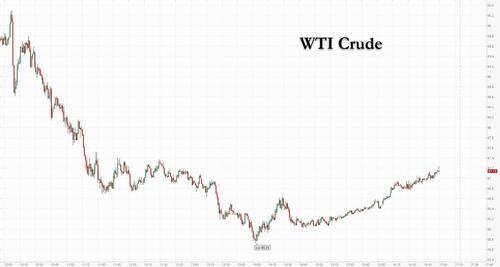
Speaking on CNBC, Goldman's head of commodity strategy, Jeff Currie explained why the lower the price of oil drops, the higher it will jump because - all else equal - as demand for oil rises thanks to lower prices without enough supply to match, inventories will shrink far faster and tank bottom will be hit well before the NBER admits a recession has arrived. A similar development took place in Jan 2007 more than a year before the 2008 recession... but not before oil soared to an all time high. This time won't be any different, and an early glimpse of how the spike in demand will translate into lower inventories came moments ago from the American Petroleum Institute (API) which reported a draw this week for crude oil of 448,000 barrels, while analysts predicted a far smaller draw of 117,000 barrels.
- Crude: -448K, Exp. -117K
- Gasoline: -4.480MM, Exp. -1.1MM
- Distillates: -759K
- Cushing: +250K
In the week prior, OilPrice reminds us that the API reported a surprise build in crude oil inventories of 2.156 million barrels after analysts had predicted a draw of 400,000 barrels. Of course, a big part of the delta is the continued drain of the Biden Strategic Midterm Reserve: the latest draw comes as the Department of Energy released another 3.4 million barrels from the Strategic Petroleum Reserves in week ending August 12, to 461.2 million barrels.
US crude inventories have shed some 61 million barrels since the start of 2021, with a 1.7 million barrel gain since the start of 2020, according to API data. US crude oil production data for the week ending August 5 rose 100,000 bpd to 12.2 million bpd, according to the latest weekly EIA data.
WTI was trading down on Tuesday on disappointing economic data out of China and the improving prospects of reaching a nuclear deal with Iran.
The API also reported a draw in gasoline inventories this week of 4.480 million barrels for the week ending Aug 12, compared to the previous week's 627,000-barrel draw. Distillate stocks saw a draw of 759,000 barrels for the week, compared to last week's 1.376-million-barrel increase. Cushing inventories rose by 250,000 barrels this week. Last week, the API saw a build of 910,000 barrels. Official EIA Cushing inventories for week ending August 5 was 25.189 million barrels, up from 24.466 million barrels in the prior week.
At 5:00 pm ET, WTI was trading down at $87.13 (-2.55%), with Brent trading down at $92.71. In a few weeks, both will be trading far higher.
Speaking on CNBC, Goldman’s head of commodity strategy, Jeff Currie explained why the lower the price of oil drops, the higher it will jump because – all else equal – as demand for oil rises thanks to lower prices without enough supply to match, inventories will shrink far faster and tank bottom will be hit well before the NBER admits a recession has arrived. A similar development took place in Jan 2007 more than a year before the 2008 recession… but not before oil soared to an all time high. This time won’t be any different, and an early glimpse of how the spike in demand will translate into lower inventories came moments ago from the American Petroleum Institute (API) which reported a draw this week for crude oil of 448,000 barrels, while analysts predicted a far smaller draw of 117,000 barrels.
- Crude: -448K, Exp. -117K
- Gasoline: -4.480MM, Exp. -1.1MM
- Distillates: -759K
- Cushing: +250K
In the week prior, OilPrice reminds us that the API reported a surprise build in crude oil inventories of 2.156 million barrels after analysts had predicted a draw of 400,000 barrels. Of course, a big part of the delta is the continued drain of the Biden Strategic Midterm Reserve: the latest draw comes as the Department of Energy released another 3.4 million barrels from the Strategic Petroleum Reserves in week ending August 12, to 461.2 million barrels.
US crude inventories have shed some 61 million barrels since the start of 2021, with a 1.7 million barrel gain since the start of 2020, according to API data. US crude oil production data for the week ending August 5 rose 100,000 bpd to 12.2 million bpd, according to the latest weekly EIA data.
WTI was trading down on Tuesday on disappointing economic data out of China and the improving prospects of reaching a nuclear deal with Iran.
The API also reported a draw in gasoline inventories this week of 4.480 million barrels for the week ending Aug 12, compared to the previous week’s 627,000-barrel draw. Distillate stocks saw a draw of 759,000 barrels for the week, compared to last week’s 1.376-million-barrel increase. Cushing inventories rose by 250,000 barrels this week. Last week, the API saw a build of 910,000 barrels. Official EIA Cushing inventories for week ending August 5 was 25.189 million barrels, up from 24.466 million barrels in the prior week.
At 5:00 pm ET, WTI was trading down at $87.13 (-2.55%), with Brent trading down at $92.71. In a few weeks, both will be trading far higher.







